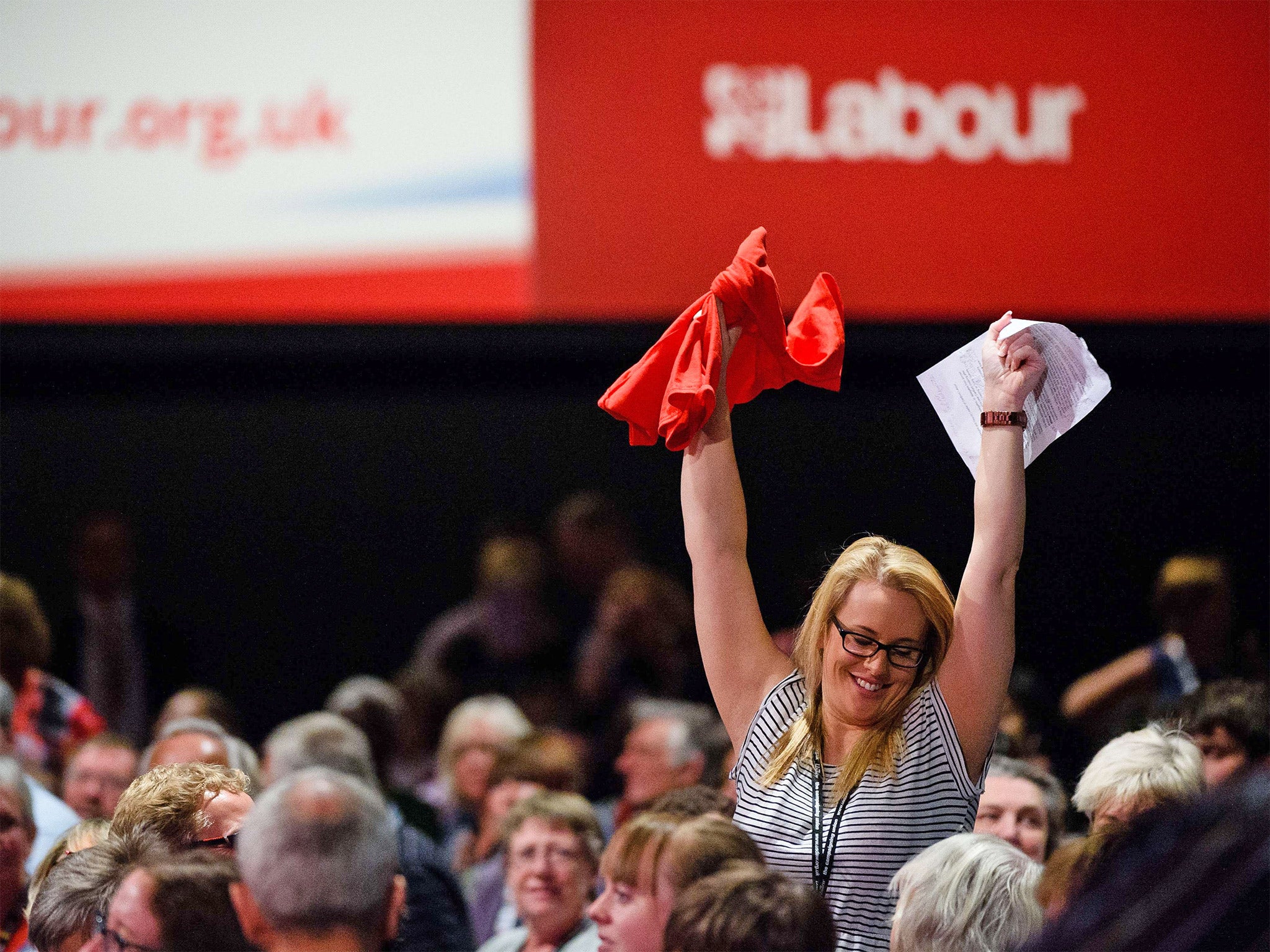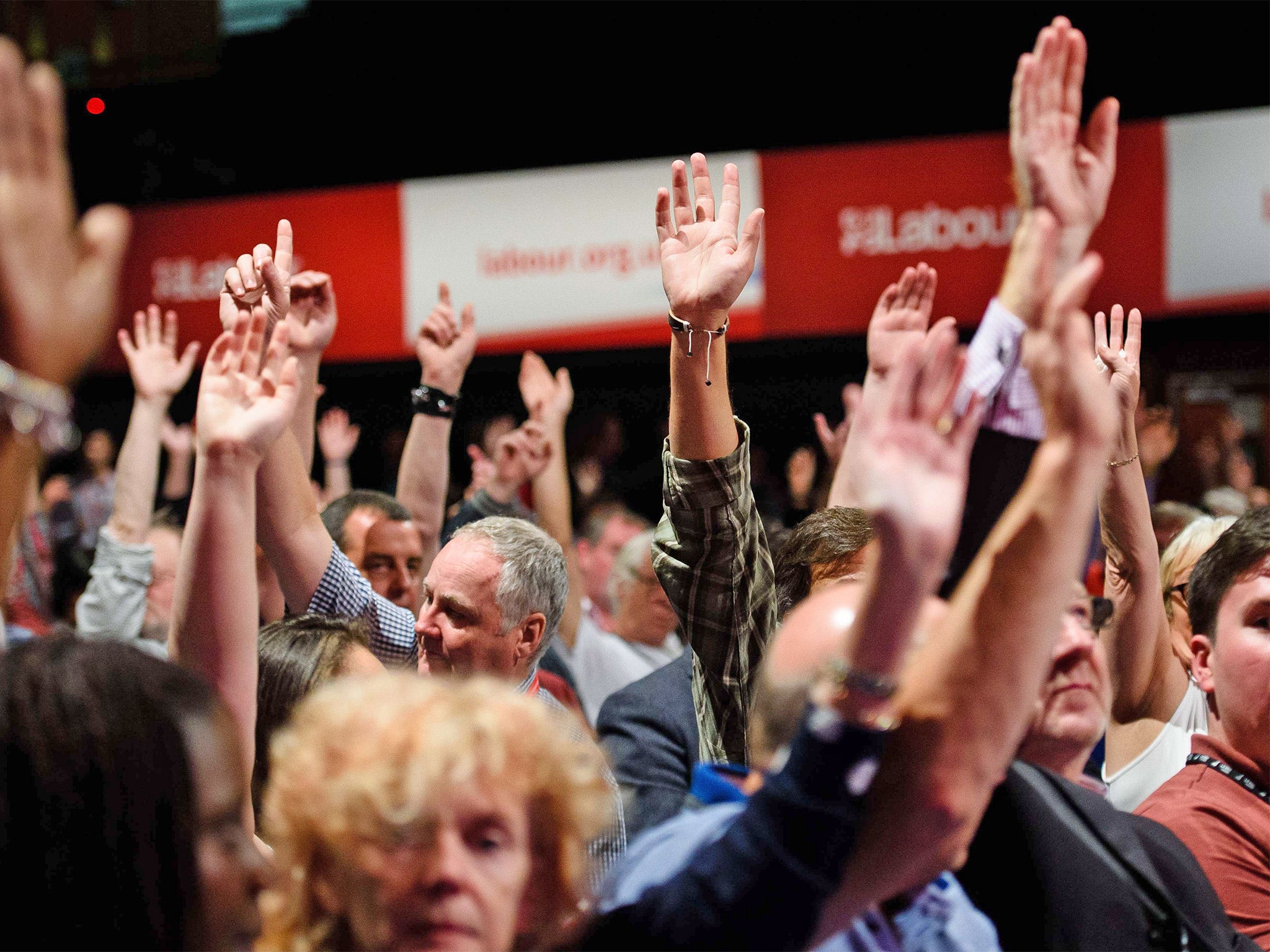Labour Party conference: A week 'more like an amateur village production than a Hollywood blockbuster’
It has been suggested that this conference is a return to the Labour Party of the 1980s, when all was chaos

Your support helps us to tell the story
From reproductive rights to climate change to Big Tech, The Independent is on the ground when the story is developing. Whether it's investigating the financials of Elon Musk's pro-Trump PAC or producing our latest documentary, 'The A Word', which shines a light on the American women fighting for reproductive rights, we know how important it is to parse out the facts from the messaging.
At such a critical moment in US history, we need reporters on the ground. Your donation allows us to keep sending journalists to speak to both sides of the story.
The Independent is trusted by Americans across the entire political spectrum. And unlike many other quality news outlets, we choose not to lock Americans out of our reporting and analysis with paywalls. We believe quality journalism should be available to everyone, paid for by those who can afford it.
Your support makes all the difference.Among the thousands who poured into Brighton for this week’s Labour conference was a high ranking European diplomat watching with a detached professional interest. Asked what he thought, he replied: “Being at other conferences was like sitting through a Hollywood blockbuster, but this is like an amateur production in the village hall – no, I don’t mean to be insulting. Local amateur productions mean a lot to people.”
Indeed. It is fun to watch an amateur cast perform with more enthusiasm than expertise. If they fluff their lines, or a prop collapses, it adds to the fun. Similarly, it has been a fun week in Brighton, watching the Labour faithful under their new and unusual leader.
The people who do the grunge work of organising a conference, making sure that it starts on time, that the microphones work, that speeches are accurately transcribed and so on – that part of the operation was as professional as ever, but in the space at the top where political decisions are made and the party is given its direction, it was amateur night in Brighton.
That is part of Jeremy Corbyn’s charm, for those to whom he appeals. His greatest single achievement has been to draw a generation of young activists into electoral politics by being who he is, an unspun and somewhat unprofessional political believer who is not controlled or hemmed in by advisers and spin doctors.
There were a lot of under-25s in Brighton finding the experience invigorating. And they were not alone. Here and there, you could spot the class warriors of yesterday, grey haired veterans of the anti-poll tax campaign, or the CND marches of the early 1980s, or even the 1960s marches against the Vietnam war – pensionable protesters who have been on the losing side of so many political arguments for so many years that they are quite bewildered that one of their own is now leader of the Labour Party.
“All right, the leader has changed, but the Labour Party hasn’t changed, has it? So, what next?” asked one lady in her sixties, an old Trotskyist who paid her £3 to vote for Mr Corbyn and turned up to be in the hall, instead of outside, protesting.
It has been suggested that this conference is a return to the Labour Party of the 1980s, when all was chaos, and if the leader got the conference to vote the way he wanted, he was in luck. In Tony Blair’s hey day, by contrast, annual conferences were a parade. The delegates sat in their places, they heard the speeches, if there was a vote they were told how the leadership wanted them to vote, and in due course, they were told that the leadership had got the result it wanted. It was very disciplined and very dull.
Mr Corbyn’s arrival will put some political meaning back into these conferences and the inner life of the party. And this week in Brighton was very unlike the 1980s in that it was friendly and polite. In the bad old days, speakers were heckled, and unpleasant arguments broke out all over the hall, occasionally descending into violence. There were no angry arguments this week, partly because so many big names stayed away. There are four former party leaders – Neil Kinnock, Tony Blair, Gordon Brown and Ed Miliband – still alive and active: none showed up. Other well-known figures, such as Chuka Umunna and Tristram Hunt, high tailed it before the leader’s speech.
Mr Corbyn was more approachable than previous leaders, putting himself around the fringe events without the usual phalanx of minders to separate him from the unwashed – but he did seem to be having trouble adjusting to the freak circumstances that have placed him centre stage. The starkest example was his handling of the Trident issue, which has divided Labour before. Hugh Gaitskell declared in 1960 that he would “fight and fight and fight again” to “save” the Labour Party from becoming a party of unilateral nuclear disarmament. In the 1980s, when unilateralism was party policy, Mr Kinnock went into battle to reverse it, succeeding at the second attempt. In both cases, no one was left in any doubt that the leader intended to impose his will on the party.
The roles have now changed. The party is for Trident, the leader is against. “I’ve made my own position clear, and I believe I have a mandate from my election on it. I don’t believe £100bn on a new generation of nuclear weapons taking up a quarter of our defence budget is the right way forward,” Mr Corbyn announced.

But he has just appointed a shadow defence secretary, Maria Eagle, and shadow foreign secretary, Hilary Benn, who disagree. Two of Labour’s three biggest affiliated unions, Unite and the GMB, have thousands of members in the defence industries, including 7,000 in Barrow, Cumbria, where there is no alternative employment.
In this new world where the party members, it is said, are going to be the ultimate determiners of policy, Mr Corbyn could go over the heads of the shadow cabinet and unions who did so much tomake him leader, to change policy, after which he could instruct Ms Eagle, Mr Benn and others to back the party line or resign. But nothing suggests that he has the determination or organisational ability to stamp his authority so decisively. It seems he is content to drift along being publicly at odds with official party policy. It is a familiar situation for him: he has been at odds with Labour policy for most of his adult life. It is just a very peculiar position for a party leader.
An oddity about his speech was that there was no mention of the general election Labour has just lost, nor of the one in 2020, nor even that Labour used to be a party of government. But in a revealing slip, he did claim to have a mandate from “59 per cent of the electorate”, as if the entire country had taken part in Labour’s leadership election.
It was left to his deputy, Tom Watson, to praise Labour’s record in government and stress the importance of putting the “summer of introspection” behind to concentrate on getting back into power. In these strange days, Labour has a deputy leader who talks like a leader, and a leader who talks like a rank-and-file activist.
Join our commenting forum
Join thought-provoking conversations, follow other Independent readers and see their replies
0Comments